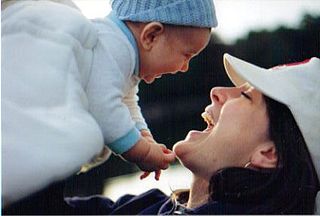Related Research Articles
Psychoanalysis is a set of theories and therapeutic techniques that deal in part with the unconscious mind, and which together form a method of treatment for mental disorders. The discipline was established in the early 1890s by Sigmund Freud, whose work stemmed partly from the clinical work of Josef Breuer and others. Freud developed and refined the theory and practice of psychoanalysis until his death in 1939. In an encyclopedia article, he identified the cornerstones of psychoanalysis as "the assumption that there are unconscious mental processes, the recognition of the theory of repression and resistance, the appreciation of the importance of sexuality and of the Oedipus complex." Freud's students Alfred Adler and Carl Gustav Jung developed offshoots of psychoanalysis which they called individual psychology (Adler) and Analytical Psychology (Jung), although Freud himself wrote a number of criticisms of them and emphatically denied that they were forms of psychoanalysis. Psychoanalysis was later developed in different directions by neo-Freudian thinkers, such as Erich Fromm, Karen Horney, and Harry Stack Sullivan.
Psychosomatic medicine is an interdisciplinary medical field exploring the relationships among social, psychological, behavioral factors on bodily processes and quality of life in humans and animals.
Psychoanalytic theory is the theory of personality organization and the dynamics of personality development relating to the practice of psychoanalysis, a clinical method for treating psychopathology. First laid out by Sigmund Freud in the late 19th century, psychoanalytic theory has undergone many refinements since his work. The psychoanalytic theory came to full prominence in the last third of the twentieth century as part of the flow of critical discourse regarding psychological treatments after the 1960s, long after Freud's death in 1939. Freud had ceased his analysis of the brain and his physiological studies and shifted his focus to the study of the psyche, and on treatment using free association and the phenomena of transference. His study emphasized the recognition of childhood events that could influence the mental functioning of adults. His examination of the genetic and then the developmental aspects gave the psychoanalytic theory its characteristics. Starting with his publication of The Interpretation of Dreams in 1899, his theories began to gain prominence.

Psychology is an academic and applied discipline involving the scientific study of human mental functions and behavior. Occasionally, in addition or opposition to employing the scientific method, it also relies on symbolic interpretation and critical analysis, although these traditions have tended to be less pronounced than in other social sciences, such as sociology. Psychologists study phenomena such as perception, cognition, emotion, personality, behavior, and interpersonal relationships. Some, especially depth psychologists, also study the unconscious mind.

Schizoid personality disorder is a personality disorder characterized by a lack of interest in social relationships, a tendency toward a solitary or sheltered life style, secretiveness, emotional coldness, detachment, and apathy. Affected individuals may be unable to form intimate attachments to others and simultaneously possess a rich and elaborate but exclusively internal fantasy world. Other associated features include stilted speech, a lack of deriving enjoyment from most activities, feeling as though one is an "observer" rather than a participant in life, an inability to tolerate emotional expectations of others, apparent indifference when praised or criticized, a degree of asexuality, and idiosyncratic moral or political beliefs.
Bodymind is an approach to understand the relationship between the human body and mind where they are seen as a single integrated unit. It attempts to address the mind–body problem and resists the Western traditions of mind–body dualism. The term bodymind is also typically seen and encountered in disability studies, referring to the intricate and often inseparable relationship between the body and the mind, and how these two units might act as one. The field of psychosomatic medicine investigates the embodied manifestations of psychological processes.

Alexithymia, also called emotional blindness, is a neuropsychological phenomenon characterized by significant challenges in recognizing, expressing, and describing one's own emotions. It is associated with difficulties in attachment theory and interpersonal relations. While there is no scientific consensus on its classification as a personality trait, medical symptom, or mental disorder, alexithymia is highly prevalent among individuals with autism spectrum disorder (ASD), ranging from 50% to 85% of prevalence.
Reduced affect display, sometimes referred to as emotional blunting or emotional numbing, is a condition of reduced emotional reactivity in an individual. It manifests as a failure to express feelings either verbally or nonverbally, especially when talking about issues that would normally be expected to engage the emotions. Expressive gestures are rare and there is little animation in facial expression or vocal inflection. Reduced affect can be symptomatic of autism, schizophrenia, depression, posttraumatic stress disorder, depersonalization disorder, schizoid personality disorder or brain damage. It may also be a side effect of certain medications.

Affect, in psychology, refers to the underlying experience of feeling, emotion, attachment, or mood.

Franz Gabriel Alexander was a Hungarian-American psychoanalyst and physician, who is considered one of the founders of psychosomatic medicine and psychoanalytic criminology.

Psychodynamics, also known as psychodynamic psychology, in its broadest sense, is an approach to psychology that emphasizes systematic study of the psychological forces underlying human behavior, feelings, and emotions and how they might relate to early experience. It is especially interested in the dynamic relations between conscious motivation and unconscious motivation.
Somatosensory amplification (SSA) is a tendency to perceive normal somatic and visceral sensations as being relatively intense, disturbing and noxious. It is a common feature of hypochondriasis and is commonly found with fibromyalgia, major depressive disorder, some anxiety disorders, Asperger syndrome, and alexithymia. One common clinical measure of SSA is the Somatosensory Amplification Scale (SSAS).
Robert Michael Bagby is a Canadian psychologist, senior clinician scientist and director of clinical research at the Centre for Addiction and Mental Health (CAMH). He is a full professor in the Department of Psychiatry, University of Toronto. He became a full professor of psychology at the University of Toronto Scarborough campus in July 2011.

Peter Fonagy, is a Hungarian-born British psychoanalyst and clinical psychologist. He studied clinical psychology at University College London. He is a Professor of Contemporary Psychoanalysis and Developmental Science Head of the Division of Psychology and Language Sciences at University College London, Chief Executive of the Anna Freud Centre, and a training and supervising analyst in the British Psycho-Analytical Society in child and adult analysis. His clinical interests center on issues of borderline psychopathology, violence, and early attachment relationships. His work attempts to integrate empirical research with psychoanalytic theory. He has published over 500 papers, and 270 chapters and has authored 19 and edited 17 books.
Supportive psychotherapy is a psychotherapeutic approach that integrates various therapeutic schools such as psychodynamic and cognitive-behavioral, as well as interpersonal conceptual models and techniques.
Luciano "Luc" Ciompi is a Swiss psychiatrist. He was professor of psychiatry, medical director of the University Social Psychiatric Clinic and co-director of the Department of Psychiatry of the University of Berne/Switzerland from 1977 to 1994. He is the founder of the concept of affect-logics, an interdisciplinary theory of the rules of interaction between emotion and cognition, and the founder of Soteria Berne, He also proposed a conceptual framework towards an integrative, psycho-socio-biological understanding of mental illnesses, and promoted community-based halfway institutions for crisis intervention and social reintegration of the mentally ill.
Affect regulation and "affect regulation theory" are important concepts in psychiatry and psychology and in close relation with emotion regulation. However, the latter is a reflection of an individual's mood status rather than their affect. Affect regulation is the actual performance one can demonstrate in a difficult situation regardless of what their mood or emotions are. It is tightly related to the quality of executive and cognitive functions and that is what distinguishes this concept from emotion regulation. One can have a low emotional control but a high level of control on his or her affect, and therefore, demonstrate a normal interpersonal functioning as a result of intact cognition.
Acathexis is a psychoanalytic term for a lack of emotional response to significant memories or actual interactions, where such a response would normally be expected.
Diana Foșha is a Romanian-American psychologist, known for developing accelerated experiential dynamic psychotherapy (AEDP), and for her work on the psychotherapy of adults suffering the effects of childhood attachment trauma and abuse.
Lance M. Dodes is an American psychiatrist and psychoanalyst best known for his theory that all addictions are psychological compulsions.
References
- ↑ McDougall, J. (1984). 'The "Dis-Affected" Patient: Reflections on Affect Pathology'. Psychoanalytic Quarterly , 53:386-409
- ↑ McDougall, J. (1989) Theaters of the Body: A Psychoanalytic Approach to Psychosomatic Illness, Norton. p.93
- ↑ McDougall, J. (1985) Theaters of the Mind: Truth and Illusion on the Psychoanalytic Stage Basic Books pp.160-164
- 1 2 McDougall, J. (1989) Theaters of the Body: A Psychoanalytic Approach to Psychosomatic Illness, Norton. p.103
- ↑ McDougall, J. (1989) Theaters of the Body: A Psychoanalytic Approach to Psychosomatic Illness, Norton. p.90
- ↑ McDougall, J. (1989) Theaters of the Body: A Psychoanalytic Approach to Psychosomatic Illness, Norton. p.94
- ↑ Taylor, G. J. endorsement, in McDougall, J. (1989) Theaters of the Body: A Psychoanalytic Approach to Psychosomatic Illness, Norton. back cover
- ↑ Krystal, H. Integration and Self-Healing: Affect, Trauma, Alexithymia. The Analytic Press. p256
- ↑ Taylor, G. J. endorsement, in McDougall, J. (1989) Theaters of the Body: A Psychoanalytic Approach to Psychosomatic Illness, Norton. back cover